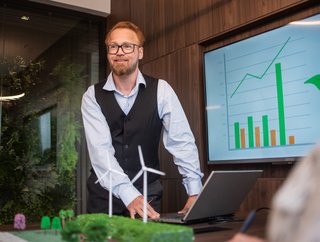Smart tech can boost business sustainability in 6 key areas

More and more, business leaders are identifying that sustainability initiatives are not only beneficial for climate change, but can also have positive impacts on a company’s bottom line, when executed effectively.
Resultantly, companies are investing in smart technology like AI, machine learning, and blockchain to help accelerate and streamline sustainability efforts, operate more efficiently and drive shareholder value.
While businesses, especially those with large national or global footprints, often face the challenge of scalability when it comes to implementing sustainability action plans across a variety of locations, a recent PriceWaterhouseCooper study found that more than 70% of sustainable goals could be accelerated through technology adoption.
New technologies can step into this arena to help businesses overcome these challenges among others. Here are six areas of sustainability businesses can improve with the help of tools such as AI, machine learning, and blockchain development.
Energy Efficiency
Businesses can optimise energy efficiency through data analysis, and, in turn, identify opportunities for reduced energy consumption and potentially lower bills. For example, connected sensor technology can adjust lighting and air conditioning to occupancy levels. Fewer people in the office can equate to less energy usage. Industrial manufacturing company, Siemens, uses machine learning to optimise data center energy consumption. In the process, the company cut energy costs by 10% and carbon emissions by 16%.
Renewable Energy
A major challenge for businesses involving climate change is sourcing energy that does not come from burning fossil fuels. In 2019, burning fossil fuels accounted for 74% of U.S. greenhouse gas emissions.
Businesses that choose renewable energy sources can use AI to increase efficiency and reduce their carbon footprint. Google installed a 1.6 MW solar array at its company headquarters as part of its plan to wholly utilise carbon-free energy by 2030. They use AI to maximise the use of that clean energy across data centers, shifting energy-intensive processes to the times of day when the most electricity is available.
Investing in renewables, committing to optimising green energy production, and employing technology to optimise usage can yield dividends in terms of climate change.
Sustainable Supply Chain
Supply chain transparency is essential for building a sustainable business and negating climate change, but tracing a product’s journey is no easy task. Blockchain technology can step in to help a business ensure sustainable sourcing methods are utilised for raw materials. Walmart recently partnered with IBM to implement a blockchain based supply chain tracking system to follow products and materials.
Before applying technology to the supply chain, it took a team more than six days to find the source of a package of mangoes being sold at a store location. Working with IBM, that team could eventually trace each package in less than three seconds. Sustainable sourcing can help businesses reduce emissions, better manage climate risks, and even streamline operations.
Sustainable Product Design
Analysing product performance data can be accomplished through AI algorithms that optimise product design for energy efficiency and recyclability.
As of 2010, Nike employed AI and machine learning to design a sustainable running shoe made with recyclable materials that maintained their standards of durability and athletic performance. The carbon footprint of the product was reduced by 30%.
Applying technology to product design can mean reductions in energy usage and carbon emissions for businesses.
Waste and Recycling Management
Sustainability measures are not only important at a product’s creation, but also when it reaches the end of its usable life. Waste accounts for an estimated 20% of methane emissions across the world.
Today, new technologies can analyse waste generation to identify areas in which organisations can reduce waste output. Waste metering technology is able to monitor the types and volumes of waste being generated to optimise service. It can also identify areas for increased recycling or waste elimination.
One example, the city of Amsterdam implemented an AI-based application in 2021 that can detect garbage and recycling on the street. It automatically maps the area and once the material is identified by the AI in real time, the information is shared with the city’s waste management department to clean up. The application is able to quickly solve waste disposal issues in Amsterdam at scale.
ESG Reporting
Embracing technologies that aid in implementing sustainable changes to businesses can also enable better, more accurate ESG reporting. Disclosing this type of information could soon become a requirement with potential new SEC Scope 3 emissions reporting rules coming in 2023 and technology adoption can help businesses be well-prepared.
Many businesses find that with the use of AI and sensor technology that data quality is improved, reporting processes can be automated, the technology can identify risks and opportunities, and they are better able to forecast future trends.
Microsoft uses AI-based carbon management software and Internet of Things for its AI for Earth programme. It can measure, manage, and find ways to reduce an organisation’s carbon footprint. That can be an attractive metric to investors measuring a company by its ESG score. Cutting emissions usually means a reduction in energy use which often translates to lower costs. Using AI for data collection and predictive analytics can provide a powerful avenue to find new methods of driving sustainability solutions.
Why apply technology to sustainability
Implementing these tools as part of a holistic sustainability program allows companies to find solutions that fit their needs and sets your business up for success in both the short- and long-term.
Smart technologies can help us accelerate the road to a more sustainable future, and the time to start is now. Implementing this technology now prepares your business for a future in which sustainability will have a bigger impact on the bottom line.
In fact, more than 74% of institutional investors said they would divest from companies with a poor environmental track record.
AI, machine learning, and blockchain technology can push businesses to achieve goals such as Zero Waste and carbon neutrality, while preparing you for the expectations of tomorrow, today.






